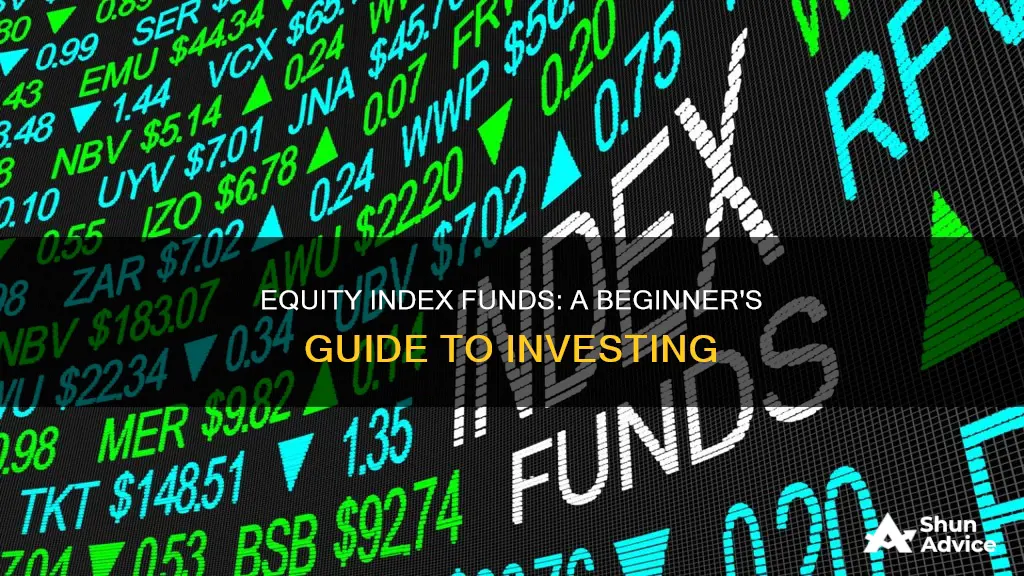
Index funds are a type of investment vehicle that tracks a market index, such as the S&P 500 or the Russell 2000. They are designed to mirror the performance of a specific market index and are considered passive investments. Index funds are typically comprised of a basket of securities, such as stocks or bonds, that are weighted in the same or similar proportion to the index being tracked. This means that if the S&P 500 drops a company from its index, the corresponding index fund will sell the stock of that company.
Index funds are a popular investment choice due to their low costs, diversification benefits, and ability to generate solid long-term returns. They are also considered less risky than investing in individual stocks since they are diversified across a wide range of securities. Additionally, index funds are often favoured over actively managed funds because they tend to have lower fees and have historically outperformed actively managed funds over the long term.
When investing in index funds, it is important to consider factors such as the fund's expense ratio, tax-cost ratio, tracking error, fund size, and liquidity. It is also crucial to align your investment choices with your financial goals, risk tolerance, and investment horizon.
To invest in index funds, you can open an online brokerage account or use a robo-advisor, which automates the investment process. You can also seek the guidance of a financial advisor to help you select the best index funds for your portfolio.
| Characteristics | Values |
|---|---|
| Type of fund | Mutual fund or exchange-traded fund (ETF) |
| Investment strategy | Passive |
| Investment aim | To track the performance of a market index |
| Examples of market indexes | S&P 500, Dow Jones Industrial Average, Nasdaq Composite, Russell 2000, MSCI EAFE |
| Advantages | Low cost, low risk, good for beginners, good long-term returns |
| Disadvantages | Lack of flexibility, inherent inclusion of all securities in an index, market-cap weighting |
What You'll Learn

Understand the different types of index funds
Index funds are a type of mutual or exchange-traded fund (ETF) that tracks the performance of a market index, such as the S&P 500, by holding the same stocks or bonds or a representative sample of them. They are defined as investments that mirror the performance of benchmarks like the S&P 500 by mimicking their makeup.
There are several types of index funds, each with its own unique strategy and focus. Here are some of the most common types:
- Broad Market Index Funds: These funds aim to capture the majority of an investable market, such as stocks, bonds, or other investable assets. They provide low-cost exposure to an entire asset class, country, or region. Examples include the Vanguard Total Stock Market ETF and the Schwab U.S. Broad Market ETF.
- Market Cap Index Funds: These funds invest based on specific market capitalization ranges. A company's market cap is equal to the total value of its outstanding shares, and companies can be divided based on these values. Examples include the Fidelity 500 Index Fund and the iShares Russell 2000 ETF.
- Equal Weight Index Funds: In these funds, each holding makes up roughly the same percentage of fund assets. This approach aims to reduce the risk of any single company becoming overvalued and accounting for a significant portion of the fund's portfolio. Examples include the Invesco S&P 500 Equal Weight ETF and the Direxion Nasdaq-100 Equal Weighted Index Shares.
- Fixed Income/Debt Index Funds: These funds track bond indices in the same way that stock funds track stock market indices, allowing them to charge low expense ratios compared to actively managed funds. Examples include the Vanguard Long-Term Bond ETF and the iShares 1-5 Year Investment Grade Corporate Bond ETF.
- Sector-Based Index Funds: These funds are great for investors with a specific view on a certain area of the economy. They allow investors to express an investment opinion without having to research individual securities. Examples include the Consumer Discretionary Select Sector SPDR Fund and the Fidelity MSCI Financials Index ETF.
- International Index Funds: These funds provide an easy way to gain exposure to geographic areas outside the U.S. by offering a diversified portfolio of international companies. Examples include the Vanguard FTSE Emerging Markets ETF and the iShares Core MSCI Total International Stock ETF.
- Socially Responsible Index Funds: These funds have become increasingly popular as investors pay more attention to how their money is invested. Some funds focus on companies with strong environmental, social, and governance (ESG) practices, while others exclude companies involved in certain industries, such as firearms, alcohol, tobacco, or gambling. Examples include the Vanguard ESG U.S. Stock ETF and the iShares Global Clean Energy ETF.
When choosing an index fund, it is important to consider factors such as the fund's asset class, index methodology, performance relative to its benchmark, and operating expense ratio. Additionally, investors should decide whether they prefer a mutual fund or an ETF, as these have different structures and trading capabilities.
Money Market Funds: Secure, Liquid, and Profitable Investments
You may want to see also

Research and analyse index funds
Researching and analysing index funds is a crucial step in the investment journey. Here are some detailed guidelines to help you navigate this process effectively:
Understanding Index Funds:
Before investing, it is essential to comprehend the nature of index funds. Index funds are a type of mutual fund or exchange-traded fund (ETF) that mirrors the performance of a specific market index, such as the S&P 500. They are passively managed, meaning the fund's holdings are adjusted only when the underlying index changes. This passive approach aims to match the index's performance without actively selecting stocks.
Identifying Investment Goals:
Clarify your investment objectives before selecting an index fund. Are you investing for retirement, or do you have a shorter-term goal in mind? Understanding your risk tolerance, budget, and time horizon will help guide your index fund choices.
Comparing Index Funds:
When comparing index funds, focus on their expense ratios and tracking errors. The expense ratio represents the annual fees associated with managing the fund, and it is crucial to minimise these costs as they can eat into your returns. The tracking error indicates how closely the fund follows the performance of its benchmark index; a lower tracking error is generally preferable.
Analysing Fund Performance:
Evaluate the historical performance of the index funds you are considering. While past performance does not guarantee future results, it can provide insight into how the fund has navigated different market conditions. Look for consistent returns that align with your investment goals.
Diversification and Risk Management:
Assess the diversification offered by the index fund. Examine the underlying securities, sectors, and geographic regions represented in the fund. Diversification helps spread risk and enhance long-term returns. Additionally, consider the fund's volatility and how it aligns with your risk tolerance.
Fund Size and Liquidity:
Larger index funds often provide greater liquidity and lower trading costs. However, it is essential to compare the trading costs and liquidity of different funds to ensure you can exit your investment if needed.
Review Fund Prospectuses:
Before investing, carefully review the fund prospectus, which contains essential information about the index fund. This document will outline the fund's investment objectives, strategies, risks, fees, and historical performance. It is crucial to understand all the pertinent details before making a decision.
Seek Professional Guidance:
If you are unsure or new to investing, consider seeking advice from a financial advisor or a robo-advisor. They can provide personalised guidance based on your financial situation and goals, helping you navigate the complexities of index fund investing.
Remember, investing in index funds is a long-term strategy, and it's important to conduct thorough research and analysis before committing your capital.
Quant Fund Investment: Strategies for Success
You may want to see also

Decide which index fund to buy
Once you have chosen an index, you can then select a fund to buy. For popular indexes, you may have a dozen or more choices, all tracking the same index. Here are some things to consider when deciding which index fund to buy:
- Cost: Index funds are passively managed, so they tend to be cheaper than actively managed funds. However, they still carry administrative costs, which are reflected in the expense ratio. This is an annual fee charged by most index funds and ETFs, which covers the operating expenses for a fund. The expense ratio is a percentage of the fund assets that is automatically deducted from your returns. As such, you want to opt for the cheapest option available.
- Diversification: One of the benefits of index funds is that they are diversified, meaning you are less likely to suffer big losses if something bad happens to one or two companies in the index. When deciding which index fund to buy, consider how diversified it is.
- Restrictions: Some index funds have limitations or restrictions that may prevent you from investing in them. For example, many mutual funds have minimum investment requirements.
- Fund provider: If the fund provider has other index funds that you are interested in, it may be more convenient to opt for a fund from that provider.
- Taxes: For certain legal reasons, mutual funds tend to be less tax-efficient than ETFs. At the end of the year, many mutual funds pay a taxable capital gains distribution, while ETFs do not.
- Investment minimums: Mutual funds often have a minimum investment amount, which can be several thousand dollars. In contrast, ETFs do not usually have a minimum investment amount, and your broker may even allow you to buy fractional shares.
- Trading costs: Some brokers charge extra for customers to buy index fund shares, so it may be cheaper to go directly through the index fund company.
Mutual Funds: Smart Strategies for Successful Investing
You may want to see also

Choose where to buy your index funds
You can purchase an index fund directly from a mutual fund company or a brokerage. The same goes for exchange-traded funds (ETFs). These are like mini mutual funds that trade like stocks throughout the day.
When choosing where to buy an index fund, consider the following:
- Fund selection: Do you want to purchase index funds from various fund families? The big mutual fund companies carry some of their competitors’ funds. However, the selection may be more limited than what’s available in a discount broker’s lineup.
- Convenience: Find a single provider who can accommodate all your needs. For example, if you’re just going to invest in mutual funds (or even a mix of funds and stocks), a mutual fund company may be able to serve as your investment hub. But if you require sophisticated stock research and screening tools, a discount broker that also sells the index funds you want may be better.
- Trading costs: If the commission or transaction fee isn’t waived, consider how much a broker or fund company charges to buy or sell the index fund. Mutual fund commissions are higher than stock trading ones (about $20 or more). Compare that with less than $10 a trade for stocks and ETFs.
- Impact investing: Want your investment to make a difference outside your portfolio? Some funds target companies with a focus on environmental or social justice causes.
- Commission-free options: Do they offer no-transaction-fee mutual funds or commission-free ETFs?
What to consider when choosing a brokerage
When choosing a brokerage, consider the following:
- Fund selection and guidance: Do they offer a wide range of index funds? Do they provide any guidance on which funds to choose?
- Convenience: Is their platform user-friendly? Do they have a mobile app?
- Costs: How much do they charge for transactions? Do they charge management fees?
Robo-advisors
Robo-advisors are another option for purchasing index funds. These platforms use automated algorithms to build and manage your investment portfolio. They're a good option if you want a more hands-off approach to investing. Some popular robo-advisors include Betterment and Wealthfront.
Aquabounty's Mutual Fund Investors: Who's Taking the Plunge?
You may want to see also

Monitor and adjust your investment
Once you've invested in equity index funds, it's important to monitor and adjust your investment periodically to ensure it aligns with your financial goals. Here are some key considerations for monitoring and adjusting your equity index fund investment:
Review Performance Regularly
It's essential to periodically review the performance of your equity index fund to ensure it's meeting your investment expectations. Compare the fund's returns against the benchmark index it tracks, keeping in mind that the returns may not be identical due to factors like investment costs and taxes. If the fund consistently underperforms the index by a significant margin, it may be time to consider alternative investment options.
Evaluate Fees and Expenses
Index funds are known for their low fees, but these costs can vary across different funds. Keep a close eye on the expense ratio, which represents the ongoing fees deducted from your investment returns. If you find that the fees are accumulating and becoming a significant proportion of your returns, it may be prudent to consider switching to a lower-cost index fund with a similar investment strategy.
Monitor Underlying Investments
Index funds are designed to mirror the performance of a specific market index. However, it's important to regularly review the underlying investments within the fund. This includes assessing the companies or sectors the fund is invested in and ensuring they align with your investment goals and risk tolerance. If the fund's composition shifts significantly or no longer matches your investment strategy, it may be time to make adjustments.
Rebalance Your Portfolio
Over time, the performance of different investments within your portfolio can cause an imbalance in your asset allocation. For example, if your equity index fund has been performing exceptionally well, it may come to dominate your portfolio, increasing your risk exposure. Periodically review your portfolio's asset allocation and make adjustments as necessary to maintain a balance that aligns with your investment strategy and risk tolerance.
Stay Informed About Market Trends
Stay informed about market trends, economic conditions, and any changes in the investment landscape that may impact your equity index fund. This includes keeping an eye on interest rates, inflation, and any shifts in the broader economic environment that could affect the performance of your investment. Being aware of market trends can help you make more informed decisions about adjusting your investment strategy.
Seek Professional Advice
Consider consulting a financial advisor, especially if your financial situation is complex or you're unsure about the best course of action. A qualified financial advisor can provide personalized advice based on your specific circumstances, investment goals, and risk tolerance. They can guide you in selecting the right index funds, diversifying your portfolio, and making informed adjustments to optimize your investment strategy.
Equity Funds: Smart Investment, Smart Returns
You may want to see also
Frequently asked questions
Equity index funds are a type of investment vehicle that tracks a market index, such as the S&P 500 or the Nasdaq Composite. They aim to match the performance of the index by holding the same stocks or a representative sample. Index funds are passively managed, meaning they don't actively pick securities or time the market.
Equity index funds offer investors a simple, low-cost way to gain exposure to a broad, diversified portfolio. They are also tax-efficient compared to many other investments and have lower fees than actively managed funds.
When choosing an equity index fund, consider the fund's fees, performance, and the index it tracks. You should also evaluate your financial situation, goals, and risk tolerance to ensure the fund aligns with your investment objectives.
You can buy shares of an equity index fund through a brokerage account or directly from a fund provider. Some popular brokerage platforms include Fidelity, TD Ameritrade, Charles Schwab, and Robinhood.
While equity index funds offer diversification and lower risk compared to individual stocks, they are still subject to market volatility. Additionally, they may underperform actively managed funds over the long term and are not suitable for investors seeking to beat the market.







